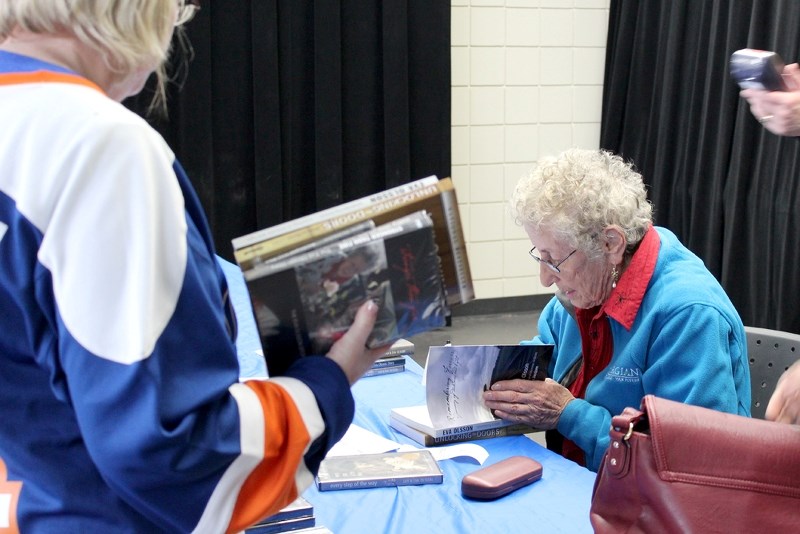Eva Olsson made a tour through schools in St. Paul and the surrounding area to speak to local students about the dangers of allowing hate to become commonplace.
On May 15, 1944, a 19-year-old Olsson and her family were rounded up and taken to Auschwitz-Birkenau, a Nazi prison camp in Poland. The Hungarian-born teen saw unspeakable horrors and was forced to endure appalling living conditions. She and her younger sister lost countless family members without so much as a goodbye, including her mother, father, sister and five nieces between the ages of two months and three-and-a-half years old.
“I am here today to speak for them and all other children whose voices were silenced by hate,” Olsson told students from Two Hills, F.G. Miller, St. Paul Regional and Glen Avon at a presentation last Thursday in the Glen Avon gymnasium. “When I was a prisoner there. I used to ask myself who could do this, animals? Animals don’t do this to each other, people do. What kind of people? People who carry hate in their heart.”
One of the most chilling aspects of Olsson’s presentation was in regard to the loss of her mother, and all of those who died in the gas chambers.
“They were forced into those gas chambers screaming and moaning, and after 20 minutes it was silent. It was dead silent. It took 20 minutes for them to die in there,” she said, going into graphic detail on how corpses would be dismembered for things like rings, gold teeth or hair. “Then came the crematorium, the ovens. That’s what we smelled day and night, human flesh burning, our families.”
Olsson added, “Eleven million people died not because they were too old to live . . . but because they were hated.” She added that even the word “hate” need not be used when one could instead say they “don’t like” something, insisting that it is a dangerous and selfish word, while is meant to be enjoyed together.
“We cannot resolve issues with anger or hate. It just gets worse. Tonight is a good time to start. When you go home, if your mom is there give her a hug, tell her you love her. Even though you can disagree with her, that’s okay. It doesn’t really matter in life who’s right or who’s wrong, that doesn’t matter. What is important in life is when you can share something so precious as love, not hate or anger,” Olsson told students.
“The Nazi bullies, they took away everything they could. The things they took away are no big deal . . . but you know something, no matter how much money any human being will ever have in their lifetime, can they ever buy another family? Never . . . Don’t ever take your family for granted, no matter what the challenges are.”
Despite the non-stop physical and mental torment, Olsson and her younger sister stayed alive until they was liberated in April of 1945 because she never gave in to the hate of her oppressors.
“How did I survive? By not giving up,” she said. “Every day I kept hoping, tomorrow will be a better day. It never happened, but I couldn’t die there. I had a younger sister and I felt responsible for her.”
Olsson, who currently lives in Bracebridge, Ont., remained silent about her traumatizing experiences during the Holocaust until 1996, but since then she has been to thousands of schools to share her message about rallying against hate. She has also written two books, Unlocking the Doors: A Woman’s Struggle Against Intolerance, and Remembering Forever: A Journey of Light and Darkness.
“It’s part of a healing process. If I wouldn’t get the feedback that I’m getting all across Canada and part of the United States, I would hang up my running shoes. I’ve done over 3,000 presentations in 17 years, and the feedback has been very rewarding,” she said, adding that it is important for young people to see the effects of hate.
“Somebody has to talk to (students). When teachers tell them, or even their parents, not to use the word hate it goes in one ear and out the other. But when they see a person that has suffered and lost their family because of hate . . . that’s what’s important, some of these children have no idea,” she said.



